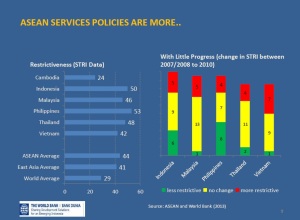Jakarta, September 26, 2013 – Indonesia Services Dialogue co-hosted the “ASEAN Business Briefing on Services” with Kadin Indonesia in Jakarta. This event was part of the ASEAN Series held by Kadin Indonesia to discuss the upcoming implementation of the ASEAN Economic Community (AEC) in 2015. ISD was particularly choosen to co-host the event because ISD was seen as an increasingly known forum for stakeholders in services to discuss obstacles, research, and regulations in services.
Chris Kanter, Vice Chairman of Kadin Indonesia, said in his opening speech that the awareness of Indonesian business players about the ASEAN Economic Community is relatively low. Although the implementation is scheduled in 2015, the ASEAN Economic Community was still seen as something far and vague. This is worrying as ASEAN Economic Community is inevitable and Indonesian business players will sooner or later feel the impact of the regional economic integration.
“What opportunities will AEC bring? What are the threats? What will change and what should Indonesian business players prepare to survive? Those are the questions that we need to answer,” Chris Kanter said.
Services is increasingly important for ASEAN economy. On average services industry contribute 40-50 percent of GDP in ASEAN countries. In Indonesia services is still like a forgotten sector despite its significant contribution to the economy. In 2012 services contributed 43 percent of our GDP. Since 2001 this sector grows 7,2% on average per year, faster than the primary and secondary sector. In 2012, 55,4 million people (49,2% or total workers) worked in services industry. The number of jobs created is almost 400.000. Another important fact is that 35% of input used in productive sector is services.
Based on those facts, Chris Kanter concluded that there need to be serious efforts to provide access to better quality services in order to increase our productivity and competitiveness especially in manufacturing. Regulatory reforms and trade liberalization are among the way to promote such access.
In the context of ASEAN Economic Community, liberalization in trade in services is done under the ASEAN Framework Agreement on Services (AFAS). Under AFAS so far ASEAN countries have agreed on 8 of 10 packages of commitment. In 2015, 128 services sector will be opened for ASEAN foreign equity participation up to 70%. In addition to that barriers to cross-border supply and consumption abroad will be eliminated.
Meanwhile, Sjamsu Rahardja from the World Bank highlighted the growing importance of services. He said the degree of which manufacturing sector is serviced seems matter for value addition. He also added that services sector depended very much on the input from other services sector, quoting a finding that 50-70 percent of intermediate inputs in services sector were also services.
Services is also very important in terms of multiplier effect. Sjamsu said the employment elasticity of services jobs to services GDP is 0,32. That means 1% of increase in services GDP (in construction, transport-communication, and trade sectors) will add 100,000-130,000 jobs in those sectors.
Despite the importance of services to our economy, unfortunately the services component in Indonesia’s merchandise export are lower compared to other ASEAN countries. The same condition is also happening in manufactured goods export (lower than Malaysia).
“We should see this as a fact that there is still room for us to increase the services element of our export. The room is big enough for everyone to ‘dance’ without ‘bumping’ into each other,” said Sjamsu.
Despite the big room to boost growth in services, according to Sjamsu ASEAN is facing a serious challenge. The Services Trade Restrictiveness Index data shows that in general ASEAN countries still impose high restriction in trade in services. According to that data, Indonesia is the second most restrictive below the Philippines.
In conclusion, Sjamsu restated the potential benefit of ASEAN economic integration especially for Indonesia’s services industry. But it will depend on coherent and sound regulatory regime. The Government needs to implement good industry-specific regulations (financial prudential, service standards, quality assurance) in parallel with opening up while addressing capacity constraints of local services providers, such as skill and qualifications.
Dionisius Narjoko from Economic Research Institute for ASEAN and East Asia (ERIA) elaborated further the technical aspects of AFAS and shared the progress of the negotiation. The focus of AFAS, he said, is actually on commercial presence or Mode 3 as Mode 1 and 2 is more or less already open. But he reminded that negotiation for Mode 3 is more difficult because ASEAN is expected to commit more than 49% of foreign equity participation. Another challenge in negotiating AFAS, said Dion, is the variation of Liberalization Rate among ASEAN countries.
“New members like Vietnam, Lao PDR, and Cambodia tend to be more committed to open their services sector while other ASEAN countries is less open. For example, Thailand is low on Liberalization Rate because the country has a regulation that applies to all sectors that limits foreign equity participation to only 49 percent. Another case is the Philippines which has many ‘footnotes’ attached to its commitments,” said Dion. (DP)




